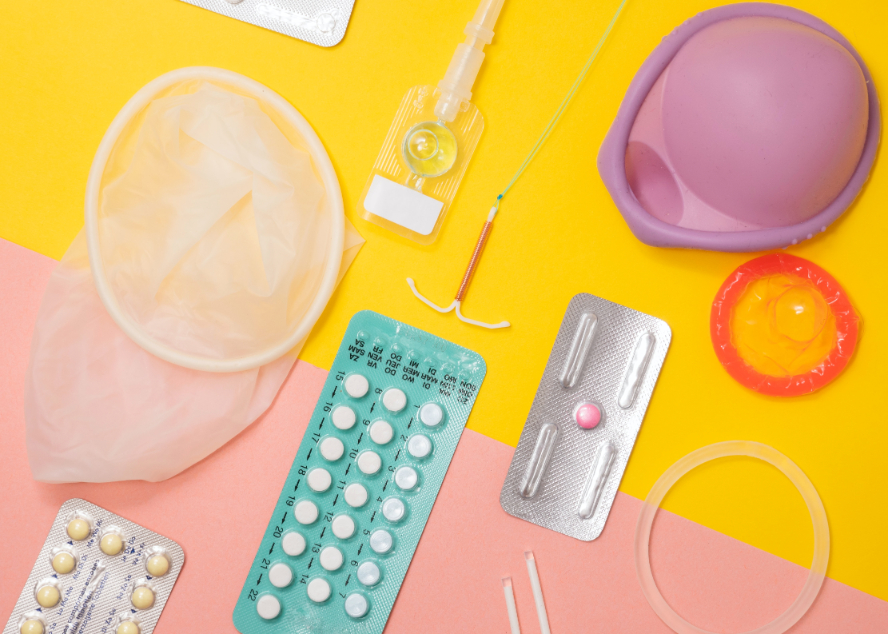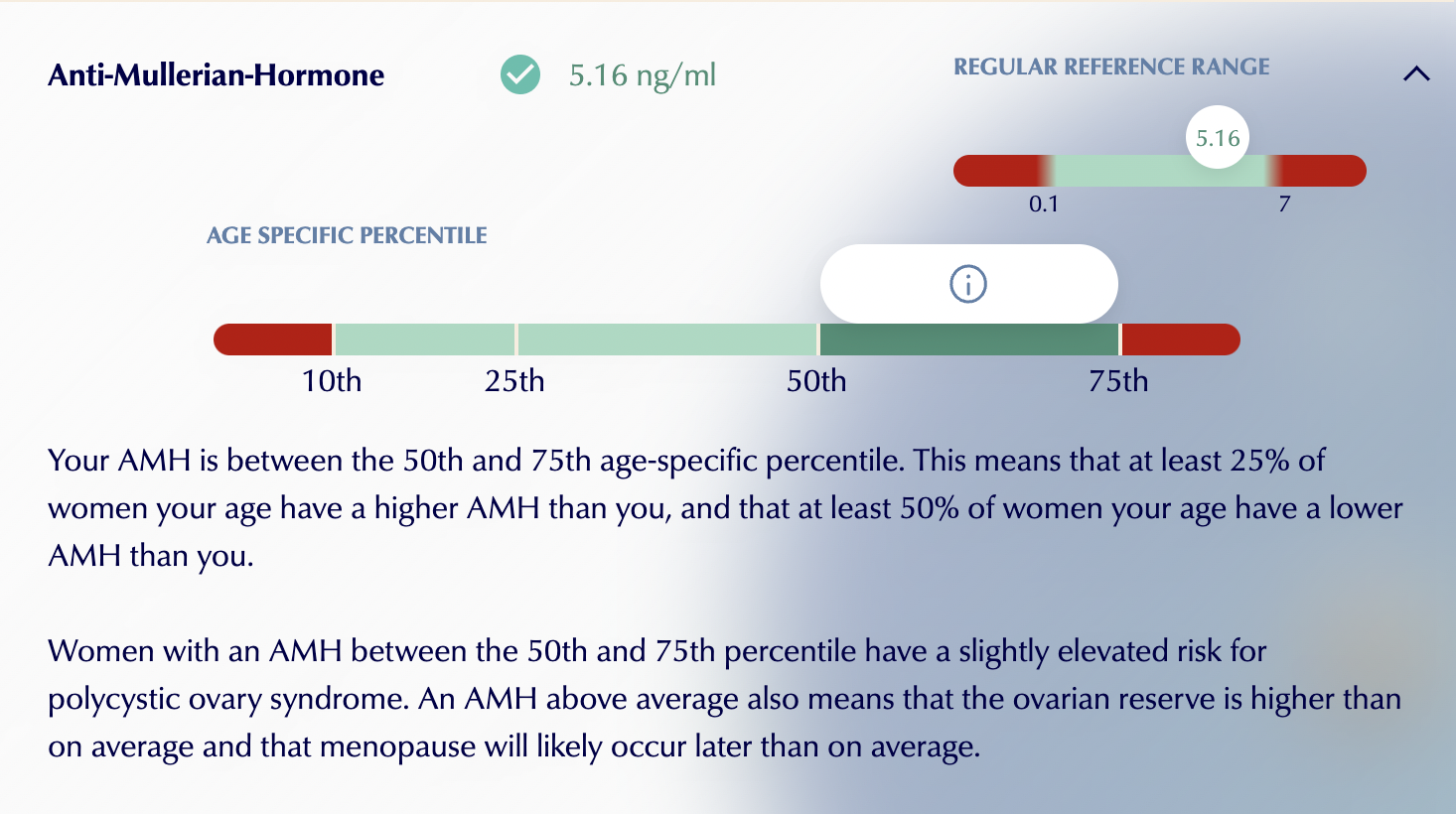

Knowledge
What your AMH levels can tell you about fertility
FSH, LH, estrogen, progesterone… If you’re struggling to have a baby, you’re probably becoming an expert on all things hormones. AMH is another big one to be aware of, as it relates to how many eggs you have. In this article, we do a deep dive into AMH, and cover:
What is AMH?
AMH is short for anti-Mullerian hormone. It’s made by cells around your growing follicles, which are fluid-filled sacs in your ovaries containing eggs. The ovaries begin producing AMH around the time an adolescent girl has her first period. In male fetuses, AMH production causes the male reproductive system to develop.
Why do AMH levels matter for fertility?
Your AMH levels are important because this hormone is the most reliable marker of ovarian reserve, or how many eggs you have remaining in your ovaries. Baby girls are born with around 1-2 million eggs, and as we age, that number gradually goes down. When there are no more eggs left in the ovaries, you begin menopause.
The AMH test is also used to estimate how well women may respond to medication used to stimulate the ovaries to release more eggs during a single menstrual cycle. AMH levels help to predict the number of eggs that can be retrieved using assisted reproduction treatments (ART).
High AMH may signal that you have a large ovarian reserve, while low AMH levels may signal that you have a low ovarian reserve.
Some studies suggest that anti-mullerian hormone can give information about egg quality in addition to quantity, but this is controversial.
In a nutshell, the AMH test is used by doctors to understand roughly how many reproductive years you have left and when you might start menopause. It’s also helpful for understanding your chances to get pregnant with assisted reproduction treatments.
Remember that fertility depends on many, many factors, and it takes two to tango. That’s why if you’re struggling to conceive you should get a comprehensive fertility test and your partner should have a semen analysis to get all the answers you need so you can get to work on building your family.
What else can an AMH test say about female health?
AMH levels can say more than how many reproductive years may be left. The AMH test is also used to:
- Uncover the reason for premature menopause
- Help learn what’s causing amenorrhea, or not having periods
- Help diagnose polycystic ovary syndrome (PCOS), a common hormonal disorder that can make it more difficult to conceive
- Check on the ovarian reserve before and after chemotherapy treatment for cancer
Normal AMH levels by age
Your AMH levels change over time. Women experience rising AMH during puberty, and they peak around age 25. Starting in the mid-twenties, AMH levels start to go down. The decline speeds up around age 30, and even more so when you reach 35-37. So it’s completely normal to have a lower ovarian reserve in your 30s and 40s.
When testing your AMH level, the results always need to be interpreted according to your age group. An AMH of 1.2 ng/ml when you’re 28 indicates low ovarian reserve, but a high ovarian reserve at the age of 40. Another thing to consider: Different labs use different reference ranges and units when measuring AMH levels, so an AMH test taken at one lab shouldn’t be compared with one taken at another lab.
One thing to be aware of is that having high AMH for your age group isn’t necessarily a good thing, as this may indicate PCOS. Studies show that an AMH value above the 75th age-specific percentile is highly indicative of PCOS. It’s important to get this checked as an age-specific high AMH may either mean PCOS, i.e. reduced fertility, or a high ovarian reserve, i.e. increased fertility.
Low AMH levels for your age group likely indicates a smaller window of time that’s possible to conceive. In general, it’s helpful to know if you have low AMH so you can make important decisions about your family planning and consider the possibility of moving forward with fertility treatments.
Testing your AMH levels with LEVY
Nowadays, there are lots of at-home fertility tests where you can check certain hormone levels including AMH with a finger prick. But experts recommend consulting a specialist to help you understand the results because fertility is such a complex topic with so many different influencing factors.
When you test your fertility with LEVY, we do a comprehensive evaluation and look for up to 65 conditions that can impact female reproductive health. After filling out an in-depth medical questionnaire, we make a personalized recommendation for which blood panels you should test. AMH is always included in the basic hormones we test.
After you visit a lab for your blood draw, your results will appear inside your LEVY profile.
Here’s what your results would look like in our user dashboard:
For the AMH test, we let you know which percentile you’re in for your specific age group, and what that means for your reproductive window. We also look at your AMH level in combination with your symptoms in order to accurately diagnose PCOS.
When it comes to hormone levels, it’s super important to look at everything as a whole and understand how the different values work together to impact reproductive health. That’s why our doctors take their time to ensure you get a deep understanding of your results. All LEVY users have a 1-on-1 call with a fertility doctor to go through the lab work step-by-step. During the call, you’ll also learn about your custom-made therapy plan to help you conceive – which may include further testing, a recommendation to see a medical specialist for treatment, lifestyle changes and counseling, or a referral to a fertility clinic.
If you’ve been struggling to conceive for over a year, it’s time to seek expert advice. LEVY Health is the fastest and most affordable way to get the answers you’re looking for on why pregnancy just hasn’t happened yet and treat the root cause of fertility struggles.
Sources:
Iwase A et al.: Anti-Müllerian hormone as a marker of ovarian reserve: What have we learned, and what should we know? Reprod Med Biol. 2016;15(3):127-136.
Shebl MD O et al.: Age-related distribution of basal serum AMH level in women of reproductive age and a presumably healthy cohort. Fert Stert. 2011;95(2):832-834.
Ebner T et al.: Basal level of anti-Müllerian hormone is associated with oocyte quality in stimulated cycles. Hum Reprod. 2006;21(8):2022-2026.
Anti-Müllerian Hormone Test. MedlinePlus. Accessed 03 Aug 2022.
Grynnerup AGA et al.: The role of anti-Müllerian hormone in female fertility and infertility – an overview. Acta Obstet Gynecol Scand. 2012;91(11):1252-60.
Anti-Mullerian Hormone Test. Cleveland Clinic. Accessed 03 Aug 2022.
De Kat AC et al.: Role of AMH in Prediction of Menopause. Front Endocrinol (Lausanne). 2021;12:733731.
Leijdekkers JA et al.: Cumulative live birth rates in low-prognosis women. Hum Reprod. 2019;34(6):1030-1041.
Depmann M et al.: Anti-Müllerian hormone does not predict time to pregnancy: results of a prospective cohort study. Gynecol Endocrinol. 2017;33(8):644-648.
Tremellen KP et al.: Anti-mullerian hormone as a marker of ovarian reserve. Aust N Z J Obstet Gynaecol. 2005;45(1):20-4.
Tremellen K and Zander-Fox D: Serum anti-Mullerian hormone assessment of ovarian reserve and polycystic ovary syndrome status over the reproductive lifespan. Aust N Z J Obstet Gynaecol. 2015;44(4):384-9.
You might also like...

Female hormones: What you need to know about reproductive hormones, the menstrual cycle, and fertility
When you’re struggling with fertility, one of the first places to look is your hormones. Certain vital reproductive hormones are in charge...
Silvia Hecher
January 17, 2024

Fertility blood test: Why does it need to be cycle days 2-5?
When you test your fertility with LEVY, you will always check your basic reproductive hormone levels (including FSH, LH, TSH, Prolactin, Estradiol,...
Lena
September 8, 2022

Forms of amenorrhea and fertility
Not getting your period is a condition called amenorrhea. It’s important for fertility because not having a menstrual cycle with monthly ovulation...
Lena
January 18, 2022

6 Interesting Facts About Ovaries You Might Not Know
Women have two ovaries which are located on either side of the uterus. They’re around 3-5 cm long – about the size...
Kayla
April 20, 2022

What to expect when testing your fertility with LEVY
If you’ve been trying to conceive for a while, it’s totally normal to feel frustrated. Why hasn’t it happened for you yet,...
Kayla
February 3, 2022

Your Complete Guide to Birth Control Options and Fertility
If you’ve been using birth control for a while, you may be wondering how it can impact your fertility now that you...
Kayla
February 21, 2022

Fertility Foods for Women to Help You Get Pregnant Faster
How you nourish your body is key not only when you have a baby in your belly, but also to help prepare...
Kayla
March 22, 2022

What your AMH levels can tell you about fertility
FSH, LH, estrogen, progesterone… If you’re struggling to have a baby, you’re probably becoming an expert on all things hormones. AMH is...
Lena
August 25, 2022

Why Vitamin D matters for fertility
Vitamin D is a very important nutrient to keep our bodies healthy and working as they should. But did you know that...
Kayla
January 18, 2022





